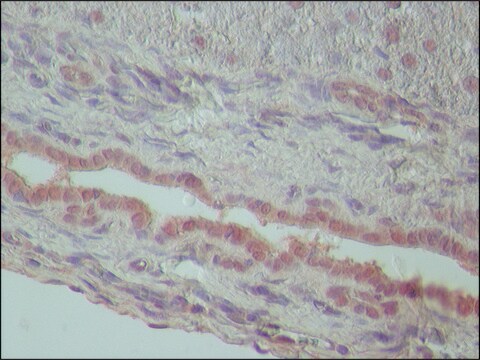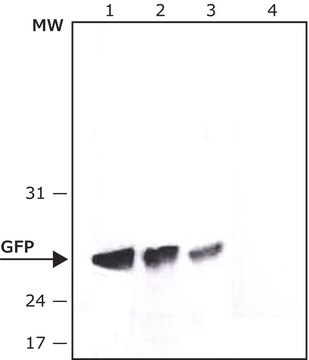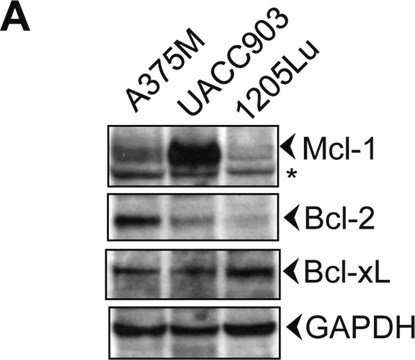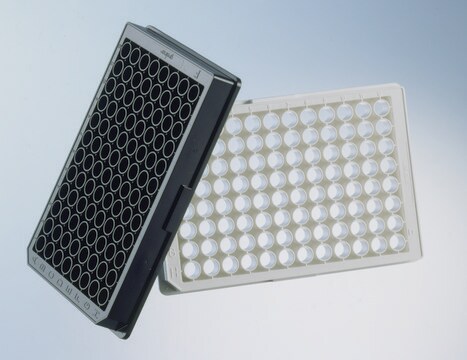推荐产品
生物源
mouse
共軛
unconjugated
抗體表格
purified immunoglobulin
抗體產品種類
primary antibodies
無性繁殖
2E2-D3, monoclonal
形狀
buffered aqueous solution
物種活性
human
技術
immunohistochemistry (formalin-fixed, paraffin-embedded sections): suitable
immunoprecipitation (IP): suitable
indirect ELISA: suitable
indirect immunofluorescence: suitable
western blot: 1-5 μg/mL
同型
IgG1κ
GenBank登錄號
UniProt登錄號
運輸包裝
dry ice
儲存溫度
−20°C
目標翻譯後修改
unmodified
基因資訊
human ... TARDBP(23435)
一般說明
HIV-1, the causative agent of acquired immunodeficiency syndrome (AIDS), contains an RNA genome that produces a chromosomally integrated DNA during the replicative cycle. Activation of HIV-1 gene expression by the transactivator Tat is dependent on an RNA regulatory element (TAR) located downstream of the transcription initiation site. The protein encoded by this gene is a transcriptional repressor that binds to chromosomally integrated TAR DNA and represses HIV-1 transcription. In addition, this protein regulates alternate splicing of the CFTR gene. A similar pseudogene is present on chromosome 20. (provided by RefSeq)
TAR DNA binding protein 43 (TDP-43) belongs to the heterogeneous nuclear ribonucleoprotein family. It is expressed in neurons, glia and other cell types. This gene is located on human chromosome 1p36.
免疫原
TARDBP (NP_031401.1, 1 a.a. ~ 260 a.a) partial recombinant protein with GST tag. MW of the GST tag alone is 26 KDa.
Sequence
MSEYIRVTEDENDEPIEIPSEDDGTVLLSTVTAQFPGACGLRYRNPVSQCMRGVRLVEGILHAPDAGWGNLVYVVNYPKDNKRKMDETDASSAVKVKRAVQKTSDLIVLGLPWKTTEQDLKEYFSTFGEVLMVQVKKDLKTGHSKGFGFVRFTEYETQVKVMSQRHMIDGRWCDCKLPNSKQSQDEPLRSRKVFVGRCTEDMTEDELREFFSQYGDVMDVFIPKPFRAFAFVTFADDQIAQSLCGEDLIIKGISVHISNA
Sequence
MSEYIRVTEDENDEPIEIPSEDDGTVLLSTVTAQFPGACGLRYRNPVSQCMRGVRLVEGILHAPDAGWGNLVYVVNYPKDNKRKMDETDASSAVKVKRAVQKTSDLIVLGLPWKTTEQDLKEYFSTFGEVLMVQVKKDLKTGHSKGFGFVRFTEYETQVKVMSQRHMIDGRWCDCKLPNSKQSQDEPLRSRKVFVGRCTEDMTEDELREFFSQYGDVMDVFIPKPFRAFAFVTFADDQIAQSLCGEDLIIKGISVHISNA
應用
Monoclonal Anti-TARDBP antibody has been used in immunohistochemistry and immunoblotting.
生化/生理作用
TAR DNA binding protein 43 (TDP-43) participates in RNA alternative splicing, stability, transcriptional regulation, mRNA transport and translation. It is associated with Alzheimer′s disease. Mutations in TDP-43 result in proteinaceous inclusions in neurons and are expected to cause frontotemporal dementia or amyotrophic lateral sclerosis.
外觀
Solution in phosphate buffered saline, pH 7.4
法律資訊
GenBank is a registered trademark of United States Department of Health and Human Services
免責聲明
Unless otherwise stated in our catalog or other company documentation accompanying the product(s), our products are intended for research use only and are not to be used for any other purpose, which includes but is not limited to, unauthorized commercial uses, in vitro diagnostic uses, ex vivo or in vivo therapeutic uses or any type of consumption or application to humans or animals.
未找到合适的产品?
试试我们的产品选型工具.
儲存類別代碼
10 - Combustible liquids
閃點(°F)
Not applicable
閃點(°C)
Not applicable
個人防護裝備
Eyeshields, Gloves, multi-purpose combination respirator cartridge (US)
Gabor G Kovacs et al.
Acta neuropathologica, 116(1), 103-118 (2007-12-11)
Frontotemporal lobar degeneration (FTLD) with mutations in the tau gene (MAPT) causes familial frontotemporal dementia with tau pathology. Many of these mutations result in morphological phenotypes resembling sporadic tauopathies, although, to date, no such cases mimicking argyrophilic grain disease (AgD)
Rates of hippocampal atrophy and presence of post-mortem TDP-43 in patients with Alzheimer's disease: a longitudinal retrospective study
Josephs KA, et al.
Lancet Neurology, 16(11), 917-924 (2017)
CSPα promotes SNARE-complex assembly by chaperoning SNAP-25 during synaptic activity
Sharma M, et al.
Nature Cell Biology, 13(1), 30-39 (2011)
Haixin Zhang et al.
Acta neuropathologica, 115(1), 115-122 (2007-09-06)
TDP-43 is a major component of ubiquitin-positive, tau-negative inclusions in amyotrophic lateral sclerosis (ALS), and frontotemporal lobar degeneration. We immunohistochemically examined the neostriatum from 14 cases of classic ALS (cALS), six cases of ALS with dementia (ALS-D), and 20 control
Mutations in UBQLN2 cause dominant X-linked juvenile and adult-onset ALS and ALS/dementia
Deng HX, et al.
Nature, 477(7363), 211-215 (2011)
我们的科学家团队拥有各种研究领域经验,包括生命科学、材料科学、化学合成、色谱、分析及许多其他领域.
联系技术服务部门
![Anti-phospho-TDP-43 [pSer409] antibody produced in rabbit ~1.0 mg/mL, affinity isolated antibody](/deepweb/assets/sigmaaldrich/product/images/407/478/bcd6d544-d187-42ed-8c1e-98bf709b4da7/640/bcd6d544-d187-42ed-8c1e-98bf709b4da7.jpg)





